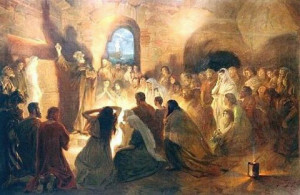We continue our study of the words descriptive of the kind of preaching in which inspired men in the first century engaged and of which God approved. The references are all found in the book of Acts.
Testify (DIEMARTURETO) – 2:40: The Analytical Greek Lexicon gives the following definition: “To make solemn affirmation, protest; to make a solemn and earnest charge; to declare solemnly and earnestly.” The “witness” (MARTURION) is intensified by the preposition “through” (DIA). This word emphasizes three aspects of gospel preaching: truth, teaching, and a solemn charge (cf. I Tim. 5:21; II tim. 2:14; 4:1). Although we cannot testify or witness in the sense in which the apostles did (see Acts 10:41), we can solemnly affirm the truth, protest the wrong and charge others to obey.
Implied in all this is that there should be no frivolity in gospel preaching. This does not mean that good, purposeful humor should not be occasionally employed. It does mean that because the subject matter is of such eternal importance and enormous magnitude, the task of preaching the gospel to others should not be taken lightly (II Cor. 5:9-11). Diligent study and preparation for preaching must be second nature to the gospel preacher (II Tim. 2:15; 4:13).
Exhort (PAREKALEI) – 2:40: To exhort is “to call for, invite to come, send for, to call upon, exhort, admonish, persuade, to beg, beseech, entreat, implore.” Vine States: “To call on, entreat; to admonish, exhort, to urge one to pursue some course of conduct (always prospective, looking to the future, in contrast to the meaning to comfort, which is retrospective, having to do with trial experienced).”
This word is used of the Ethiopian nobleman when he besought Philip to join him in the chariot (Acts 8:31). Paul also used this word of himself when he besought the Lord to remove his thorn in the flesh (II Cor. 12:8). The Bible teaches that our exhortation should be by the mercies of God (Rom. 12:1), by the authority of Christ (I Thess. 4:1), out of love (Philem. 9), growing daily (Heb. 3:13), and coupled with reproof, rebuke, and longsufferingness (I Tim. 4:2). Faithful Gospel preaching should always bring the hearers to be motivated to action.
Boldness (PARRESIAN) – 4:13: A combination of definitions reveals that boldness involves freedom in speaking, unreservedness of utterance, the absence of fear in speaking boldly. It involves a licence to speak; an authority, confidence, assurance, frankness, openness in making truths known. To speak with plainness, perspiciousness, unambiguousness, free and fearless confidence before all. To have cheerful courage, the deportment by which one becomes conspicuous or secures attention.
Peter and John’s bold proclamation of the gospel in the face of opposition should really be no surprise. They were simply following the example of their Lord (cf. Mark 8:32; John 7:26). However, the transformation of Peter from one who rebuked the Lord for His boldness to one who was himself bold is quite a commentary upon the gospel’s power to change men’s lives and upon the way the gospel should be preached.
Indeed, it should embolden gospel preachers, and all Christians, to know that they declare a message so powerful (Rom. 1:16). The teaching of Peter and John was a confident and unambiguous presentation of the truth in the face of real and serious opposition. The apostles did not water down the gospel to placate the assembled inquisitors but with cheerful courage and fearless confidence proclaimed that Christ was the only source of salvation (4:12).
Power (DUNAMEI) – 4:33: Power means might, strength, or force. This word has reference to the miraculous power which accompanied the teaching of first century, inspired men in order to prove it’s validity. (cf. John 20:30,31; Heb. 2:2-4). Every time this word (DUNAMIS) occurs in the book of Acts it has reference to the miraculous. This was not just miraculous power, but “great” (MEGA) power. Although we do not possess the miraculous, we have the divinely confirmed word of God. Therefore, when we preach the pure gospel of Christ, we have the power (DUNAMIS) of God unto salvation (Rom. 1:16). And the result will be the same as it was then: “great grace was upon them all.”
Taught (EDIDASKON) – 5:21: “To teach in a public assembly; to direct or admonish; to hold discourse with others in order to teach them; deliver didactic discourses; to impart instruction, to instill doctrine into one.” According to the International Standard Bible Encyclopedia, this “usual word for `teach’ in the N T signifies either to hold a discourse with others in order to instruct them, or to deliver a didactic discourse where there may not be direct personal and verbal participation. In the former sense it describes the interlocutory method, the interplay of ideas and words between pupils and teachers, and in the latter use it refers to the more formal monologues designed especially to give information.”
This proclamation was both public and private on a daily basis (Acts 5:42). Notice, too, that when the apostles received the word to preach, even though their life was in immediate peril, they responded promptly. Furthermore, this teaching, like the teaching of Jesus Himself, was not done in a secret (John 18:20). According to the angel’s instruction they went to the temple and taught openly.
Eric L. Padgett

